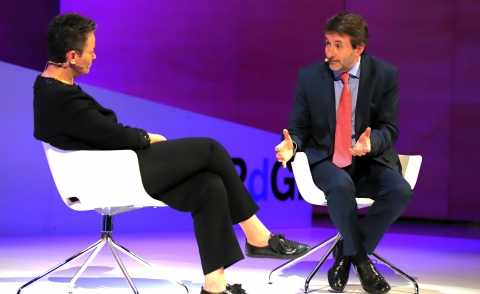AB: Since you set out in the energy industry, efficiency has always been the priority. How has this fundamental challenge of efficiency developed?
JJI: First, resources are limited; second, our company generates emissions; and third, to be more competitive, the cost of energy is important. If CO2 emissions are a problem, why not turn them into an opportunity? The challenge was therefore to reduce emissions by 15% and thus reduce our core cost, which is energy. We needed a challenge that would act as an incentive, prompt change and involve people both inside and outside the company.
AB: How do you prevent knowledge in organisations from being lost?
JJI: About 7,000 people work with us. We often think that the intelligence in a company lies in a given sector of the hierarchy, yet knowledge is to be found throughout the company. We ran competitions for ideas and 700 innovation projects were presented. These were analysed and evaluated; some will be implemented and others have evolved, etc. We created knowledge communities. For example, we have 700 people involved in team discussions about energy efficiency for improving our processes. The challenge is to reduce emissions by 22% by 2016 and by 35% by 2020. This also has an impact on people’s salaries.
AB: When does a supplier become a strategic partner?
JJI: For two decades we have been working with 100 international technology centres and universities. This amounts to 100 research groups with which we work on technical challenges because we cannot be the world’s leading specialists in everything. They involve open innovation so that we can learn how other large companies from different sectors work, and address common problems. We are changing the concept of a supplier: we set challenges for companies that provide us with services and these companies offer us solutions. The benefits are then shared.
AB: What are Repsol’s relations with groups of entrepreneurs and start-ups like?
JJI: The innovation ecosystem needs to be expanded. For two years now, we have been running the Inspire programme, whereby groups are challenged to improve a specific aspect such as graphene as an element for energy storage. Other challenges are likewise also developed and worked on.
For three years the Repsol Foundation has been promoting the Entrepreneurs’ Fund for business projects focused on energy efficiency. 400-600 initiatives are presented each year and we help to draw up the business plan and implement it. We provide a seed capital of 15 or 20%.
To encourage innovation in Europe, we must lose the fear of failure. Failing does not matter; one must make mistakes. Innovation involves taking risks and overcoming limits.
AB: What are the major obstacles in the use of open innovation concepts in business?
JJI: We ourselves are the problem. We are reluctant to change or to open our minds. Enthusiasm can matter more than obstacles. Intense involvement and a focus on specific objectives are required.
AB: Large corporations such as Tesla or General Electric freely assign their patents in order to innovate more. What do you think of such moves to deregulate intellectual property?
JJI: This is not a new debate and it is hard to make generalisations about the matter. There are industries in which you have to help the scientific team with the use of research results, because if not, you may be stifling incentive. There are other areas in which opening up can prompt greater synergy and involvement.
AB: What major social phenomena can help yield greater energy efficiency?
JJI: Habits, initiatives to improve mobility, technological development. The challenge is how to achieve sustainable growth with scarce resources and environmental stability.
AB: When in front of these young people, what commitment can you make to them?
JJI: Large corporations have undergone processes of change. Otherwise, they would not have survived. I have always been very committed to industry and technology. My obligation as Repsol is to act as a driving force and catalyst for these commitments. Each year we take on 1,000 young people, 300 of whom are university graduates.







